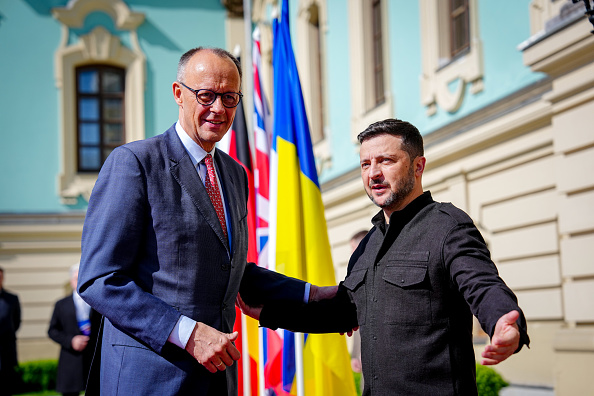Ukrainian President Volodymyr Zelenskiy is expected to arrive in Berlin on Wednesday for talks with German Chancellor Friedrich Merz, the German government said, part of a diplomatic drive to end the war in Ukraine.
Merz will receive Zelenskiy with military honours at the federal chancellery at noon (1000 GMT), a government spokesperson said in a statement.
“The focus of the visit will be on German support for Ukraine as well as efforts to achieve a ceasefire,” he added.
Ukrainian and Russian officials met this month for their first face-to-face negotiations since Russia’s full-scale invasion of its former Soviet neighbour in 2022, under pressure from U.S. President Donald Trump to end the war.
The talks failed however to produce a ceasefire agreement and Russia unleashed three nights of massive aerial attacks on Ukraine over the weekend.
With Trump signalling wavering support for Ukraine in recent months, Germany could play an increasingly important role as the country’s largest military and financial backer after the United States.
Merz, a conservative who took office this month, has vowed to take more of a leadership role in ensuring support for Ukraine than his Social Democrat predecessor Olaf Scholz.
He visited Ukraine with other European leaders within days of becoming chancellor and on Monday endorsed Ukraine’s right to launch long-range missile strikes into Russian territory – in contrast with Scholz’s cautious rhetoric on the issue.
Merz on Tuesday dampened hopes for a quick resolution to the war. “Putin and Russia clearly have at the moment no interest in a ceasefire, or a peace deal,” he said.
“This means, as a consequence, that Ukraine must continue to defend itself — and that we must actually intensify our efforts to enable Ukraine to do so.”
The war, Merz said, was not just about Ukraine’s territorial integrity.
“The political order that we jointly established with Russia after 1990 is being fundamentally called into question,” he said.
Germany is not expected, however, to announce new weapons deliveries to Ukraine given that the new government has said it would no longer publicly detail what arms it is sending Ukraine, preferring a stance of “strategic ambiguity.”
Russia accused Ukraine on Tuesday of significantly increasing drone and missile attacks on Russian territory over the past week using Western-supplied munitions.








































